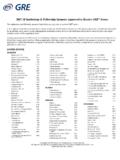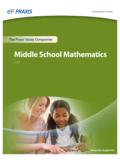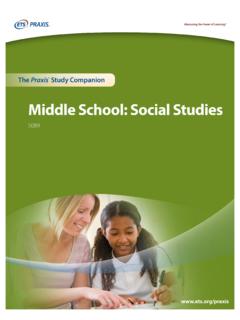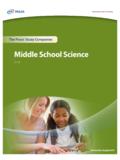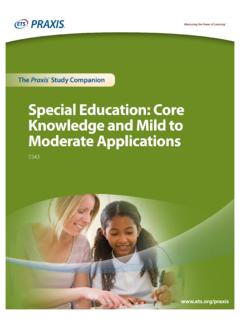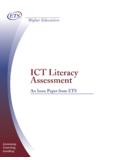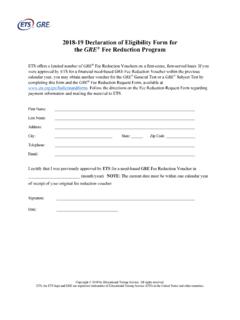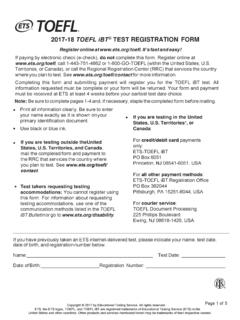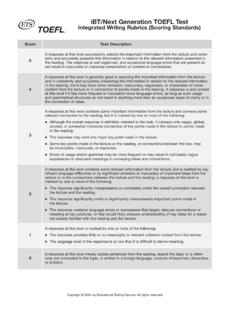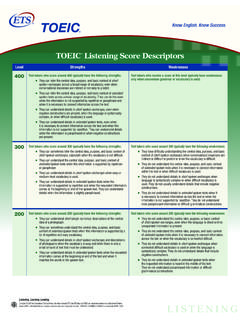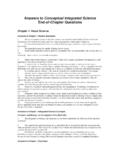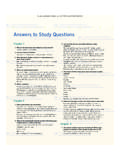Transcription of General Science: Content Knowledge - ETS Home
1 The Praxis Study Companion General Science: Content Knowledge 5435. Welcome to the Praxis Study Companion Welcome to The Praxis Study Companion Prepare to Show What You Know You have been working to acquire the Knowledge and skills you need for your teaching career. Now you are ready to demonstrate your abilities by taking a Praxis test. Using the Praxis Study Companion is a smart way to prepare for the test so you can do your best on test day. This guide can help keep you on track and make the most efficient use of your study time.
2 The Study Companion contains practical information and helpful tools, including: An overview of the Praxis tests Specific information on the Praxis test you are taking A template study plan Study topics Practice questions and explanations of correct answers Test-taking tips and strategies Frequently asked questions Links to more detailed information So where should you start? Begin by reviewing this guide in its entirety and note those sections that you need to revisit. Then you can create your own personalized study plan and schedule based on your individual needs and how much time you have before test day.
3 Keep in mind that study habits are individual. There are many different ways to successfully prepare for your test. Some people study better on their own, while others prefer a group dynamic. You may have more energy early in the day, but another test taker may concentrate better in the evening. So use this guide to develop the approach that works best for you. Your teaching career begins with preparation. Good luck! Know What to Expect Which tests should I take? Each state or agency that uses the Praxis tests sets its own requirements for which test or tests you must take for the teaching area you wish to pursue.
4 Before you register for a test, confirm your state or agency's testing requirements at How are the Praxis tests given? Praxis tests are given on computer. Other formats are available for test takers approved for accommodations (see page 44). The Praxis Study Companion 2. Welcome to the Praxis Study Companion What should I expect when taking the test on computer? When taking the test on computer, you can expect to be asked to provide proper identification at the test center. Once admitted, you will be given the opportunity to learn how the computer interface works (how to answer questions, how to skip questions, how to go back to questions you skipped, etc.)
5 Before the testing time begins. Watch the What to Expect on Test Day video to see what the experience is like. Where and when are the Praxis tests offered? You can select the test center that is most convenient for you. The Praxis tests are administered through an international network of test centers, which includes Prometric Testing Centers, some universities, and other locations throughout the world. Testing schedules may differ, so see the Praxis web site for more detailed test registration information at www.
6 The Praxis Study Companion 3. Table of Contents Table of Contents The Praxis Study Companion guides you through the steps to success 1. Learn About Your Learn about the specific test you will be taking 2. F. amiliarize Yourself with Test 13. Become comfortable with the types of questions you'll find on the Praxis tests 3. Practice with Sample Test 17. Answer practice questions and find explanations for correct answers 4. Determine Your Strategy for 24. Set clear goals and deadlines so your test preparation is focused and efficient 5.
7 Develop Your Study 27. Develop a personalized study plan and schedule 6. Review Study 31. Detailed study topics with questions for discussion 7. Review Smart Tips for 42. Follow test-taking tips developed by experts 8. Check on Testing 44. See if you qualify for accommodations that may make it easier to take the Praxis test 9. Do Your Best on Test 45. Get ready for test day so you will be calm and confident 10. Understand Your 47. Understand how tests are scored and how to interpret your test scores Appendix: Other Questions You May Have.
8 49. The Praxis Study Companion 4. Step 1: Learn About Your Test 1. Learn About Your Test Learn about the specific test you will be taking General Science: Content Knowledge (5435). Test at a Glance Test Name General Science: Content Knowledge Test Code 5435. Time hours Number of Questions 135. Format Selected-response questions Test Delivery Computer delivered Approximate Approximate Content Categories Number of Percentage of Questions Examination I. Scientific Methodology, Techniques, and 15 11%.
9 V I. History IV II. Physical Science 51 38%. II III. Life Science 27 20%. III IV. Earth and Space Science 27 20%. V. Science, Technology, and Society 15 11%. About This Test The General Science: Content Knowledge test is designed to measure the Knowledge and competencies necessary for a beginning teacher of secondary school General Science. Examinees have typically completed or nearly completed a bachelor's degree program with appropriate coursework in science and education. This test may contain some questions that will not count toward your score.
10 The development of the test questions and the construction of the test reflect the National Science Education Standards (NSES) and the National Science Teacher Association (NSTA) standards and recognize that there are conceptual and procedural schemes that unify the various scientific disciplines. These fundamental concepts and processes (systems; models; constancy and change; equilibrium; form and function) are useful in understanding the natural world. Insofar as possible, then, the test questions will have the primary objective of evaluating the Content areas by using questions that focus on conceptual understanding, critical thinking, and problem solving in science.
